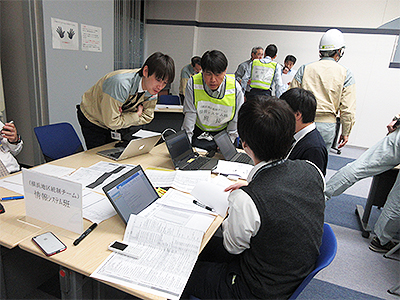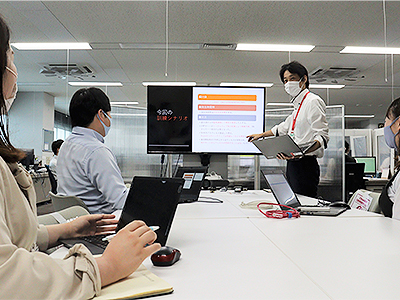Risk Management
We have a risk management system in place to deal appropriately with the various types of risk confronting us.
Risk management organization
The risks (crises) that a company faces are not limited to natural disasters, but can be various. To fulfill our social responsibility, NHK established a risk management system, including the built of organizations / rules to respond appropriately, when in emergency, and prevent these risks before occurring, minimize the damage, and prevent recurrence, by setting rules and regulations. We work on further improvements, as each and every employee understands daily risks, and take appropriate and prompt action to resolve them quickly, even if unexpected risks occur.
Responding to risks
To deal with the occurrence of risks, we set up a risk management manual for various risks and have established a system to report to top management speedily when a risk occurs. In the unlikely case of an emergency in Japan or overseas, we will quickly set up a task force in the area where the risk occurred, and also establish a general task force at the head office, to resolve the situation promptly.
Business Continuity Management (BCM)
The NHK Group BCP Basic Policy and NHK Group BCP Guidelines are distributed to all NHK Group companies worldwide. We are also currently developing our Business Continuity Management (BCM) system.
In the event of a risk, a task force is convened, and under the direction of the leader, the relevant divisions and departments work together to take prompt action regarding the basic policies of “human life first,” “responsibility to supply to customers,” and “fulfill social responsibility”.
At the head office, each plant, and domestic affiliates, the first step is to establish a disaster prevention system, and on top of that, we formulate a BCP that can respond to various risks. We strengthen our initial response and business continuity capabilities by conducting drills simulating big earthquakes and BCP drills every year to ensure prompt recovery and continuity of operations. Since last year, for preventing the spread of COVID-19, we conducted remote-based training, instead of the way members gather in conference rooms. Based on the reflections from these drills, we strive to step up our crisis management system, to respond to crises in a more practical manner, by reviewing our prevention system and revising our BCP, and relating manuals. In recent years, our overseas group companies are also gradually implementing initial response drills and BCP drills considering the circumstances of each region.
In tandem with this effort, each plant and domestic affiliates conduct annual BCM framework self-evaluations. We are working to improve our BCM system by identifying and improving problems in disaster prevention, BCP, initial response system, and BCM promotion system.

General Headquarter initial response drills (2018)
Ensuring information security
IT utilization is mandatory for companies’ global competition. At the same time, if a security incident occurs due to cyberattack or other event, it could have a severe impact on stakeholders including customers.
Our Group has been taking security measures to prevent cyber-attacks, including protection from improper connections and installing anti-virus software.
As a countermeasure against the recent increase in highly
targeted cyber attacks, we improve our security level continuously, in order to recover in a short time even in the event of a cyberattack.
Entire NHK group improve our system, methods, and response manual, such as increasing the number of security staff, introduced EDR software*, and strengthened measures from the perspective of multi-layered defense such as monitoring suspicious communications and behavior.
* A software tool that monitors the behavior of viruses after they enter the system and speed up post-infection response.

Tabletop training conducted to simulate failure scenarios for quick initial response






